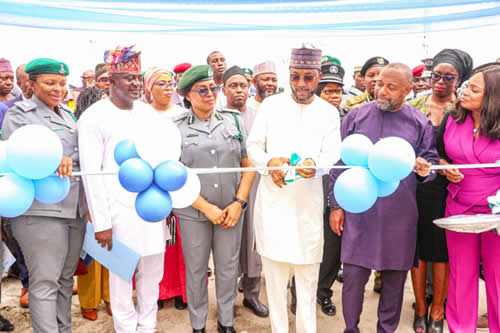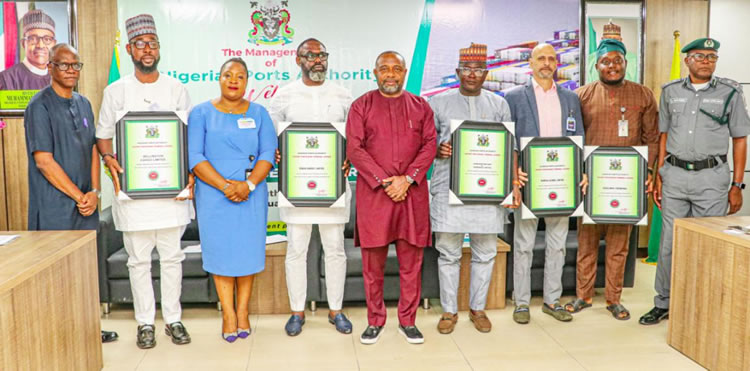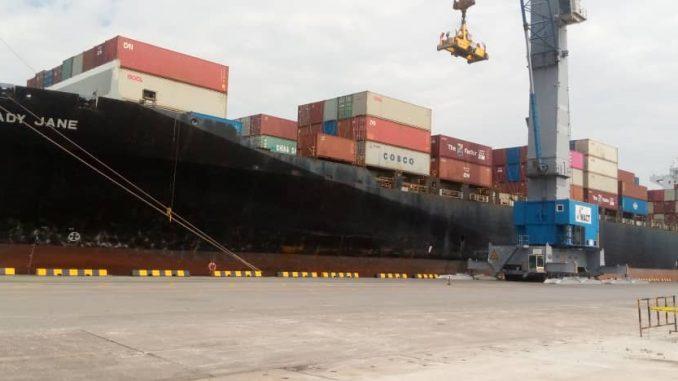
The managing director of NPA, Mohammed Bello-Koko, last week commissioned the first Export Processing Terminal at Lilypond in Ijora Lagos called Diamond Star Export Processing Terminal.
He said at the event that the terminal will help to reduce wastage and rejection of Nigerian export products and reduce the delay of documentation in gaining access to the port.
The terminal will handle all export cargoes accessing Apapa and Tin-Can Island Ports in Lagos and serve as a collection center for exporters to work with government agencies involved in export sorting, testing, and certification before sealing export goods for shipment.
The centre is one of the 10 export processing terminals recently licensed by the NPA and serves as a pre-gate where export goods will move directly into the port from Ijora thereby optimising the logistic benefits of the African Continental Free Trade Area (AfCFTA) Agreement on greater efficiency of export boxes movement into the ports for onward loading on vessels.
In his own words, “The need for Export Processing Terminals is underscored by the limitations of current port facilities in the Lagos area which are operating beyond their built capacity for cargo handling. The export terminals will serve as holding areas positioned in Lagos and Ogun States to help exporters prepare the arrival at port terminals in view of the traffic management challenges that are visible in Lagos.”
According to him, the initiative implements the National Action Plan on agro-export, the national policy of oil to non-oil export in which the Nigerian Export Promotion Council (NEPC) and the Nigeria Customs Service (NCS) have served as technical partners for setting up the export terminals.
He said the NPA will integrate barge and train movements to facilitate the movement of export boxes from the Lilypond Export Terminal through Warehouse Road to cut down on time for arrival at the port and also movement of export boxes to Tin-Can Island Port shall be from the Diamond Star consolidation point at Emmadunamix Terminal in Okota.
Both Ezra Yakusak, the executive director/CEO of the Nigeria Export Promotion Council, and the assistant comptroller general of Nigeria Customs Service (NCS) Zone A, Adeyanju Aremu, concurred that the terminal will boost the volume Nigeria’s non-oil export profile, with Adeyanju calling the development “a paradigm shift” capable of growing the GDP.
The managing director of Diamond Star Port and Terminals Limited, Mr. Olatunji Baale, called the terminal a one-stop-shop for all the government agencies in the export value chain for the delivery of export containers, of which 50,000 can be handled weekly.

Meanwhile, the Nigerian Customs Service has delimited the export process to approval terminals, hence only export laden containers from the five Export Processing Terminals recently approved by the NPA would be processed for loading on seagoing vessels, according to the Customs Area Controller, Lilypond Export Command, Compt. Mohammed Babandede.
According to him, the NPA has approved five terminals for all exports from Tin-Can and Apapa ports while the Nigeria Export Promotion Council has approved 13 domestic export warehouses (DEW) across the country.
Henceforth, Customs officers will only attend to the cargoes coming from these terminals and warehouses alone, as certified pre-gates for final sorting, inspecting, certifying, sealing, and escorting to the port for loading.
The DEW is a recent initiative by the Nigerian government designed to significantly reduce the cost of doing business for micro, small, and medium exporting companies, according to information from the Council.
The Council also licensed an aggregation centre in Abuja for as a collection point where farmers, suppliers, and merchants collectively deliver their agricultural produce and exporters can aggregate, sort, and grade/standardise their wares to required grades or sizes to meet the required export order quantity before proceeding to the DEW.
In Lagos, the five Export Processing Terminals are Diamondstar Port & Terminals Ltd, Ijora; Sundial Global Trade & Service Ltd, Kirikiri; Tenzik Energy Ltd, KLT 1; Bellington Cargo Ltd, Okokomaiko; and, Esslibra Terminal, Ikorodu.
Approved DEW operators include Kaduna Inland Dry Port, Gezewa Community (Kano), Harris Logistics, Lokoja and other locations said to be located in the six geopolitical zones.

